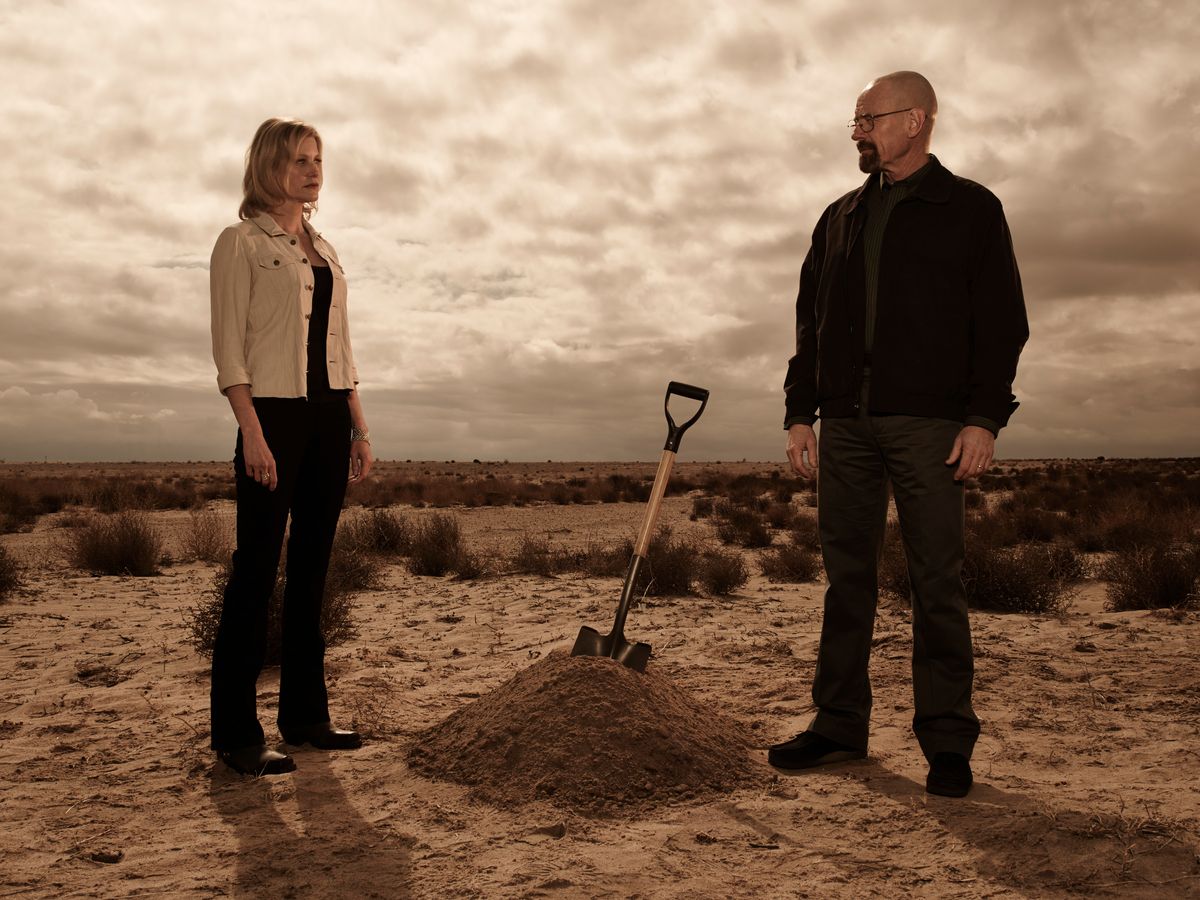In an exclusive interview with EW, "Breaking Bad" creator Vince Gilligan explained the finale episode of the most-discussed television show in recent history. (Warning: major spoilers ahead). As critics and fans debate the moral message of an ending that left a meth lord dead, semi-fulfilled, as a result of his own creation, Gilligan revealed that many of the episode's pivotal moments were inspired by other art and by the "gut feeling" of the eight writers.
Why Walt had to die:
“We didn’t feel an absolute need for Walt to expire at the end of the show. Our gut told us it was right. As the writers and I worked through all these different possibilities, it felt right, but I don’t think it was a necessity for us. There was a version we kicked around where Walt is the only one who survives, and he’s standing among the wreckage and his whole family is destroyed. That would be a very powerful ending but very much a kick-in-the-teeth kind of ending for the viewers. We talked about a version where Jesse kills Walt. We talked about a version where Walt more or less gets away with it. There’s no right or wrong way to do this job — it’s just a matter of: You get as many smart people around you as possible in the writers room, and I was very lucky to have that. And when our gut told us we had it, we wrote it, and I guess our gut told us that it would feel satisfying for Walt to at least begin to make amends for his life and for all the sadness and misery wrought upon his family and his friends. Walt is never going to redeem himself. He’s just too far down the road to damnation."
And why Jesse had to live:
"When you think of it, he didn’t really have a chance in the early days. Walt said, ‘You either help me cook meth and sell it, or else I’ll turn you in to the DEA.’ So this poor kid, based on a couple of really bad decisions he made early on, has been paying through the nose spiritually and physically and mentally and emotionally. In every which way, he’s just been paying the piper, and we just figured it felt right for him to get away. It would have been such a bummer for us, as the first fans of the show, for Jesse to have to pay with his life ultimately.”
...I prefer to believe that he got away, and he’s got a long road to recovery ahead, in a sense of being held prisoner in a dungeon for the last six months and being beaten to within an inch of his life and watching Andrea be shot. All these terrible things he’s witnessed are going to scar him as well, but the romantic in me wants to believe that he gets away with it and moves to Alaska and has a peaceful life communing with nature.”
The writers borrowed from the John Wayne western, "The Searchers" in the scene during which Walt saves Jesse:
“A lot of astute viewers who know their film history are going to say, ‘It’s the ending to The Searchers.’ And indeed it is. The wonderful western The Searchers has John Wayne looking for Natalie Wood for the entire three-hour length of the movie. She’s been kidnapped by Indians and raised as one of their own, and throughout the whole movie, John Wayne says, ‘I need to put her out of her misery. As soon as I find her, I’m going to kill her.’ The whole movie Jeffrey Hunter is saying, ‘No, we’re not — she’s my blood kin, we’re saving her,’ and he says, ‘We’re killing her.’ And you’re like, ‘Oh my god, John Wayne is a monster and he’s going to do it. You know for the whole movie that this is the major drama between these two characters looking for Natalie Wood. And then at the end of the movie, on impulse, you think he’s riding toward her to shoot her, and instead he sweeps her up off her feet and he carries her away and he says, ‘Let’s go home.’ It just gets me every time — the ending of that movie just chokes you up, it’s wonderful. In the writers room, we said, ‘Hey, what about the Searchers ending?’ So, it’s always a matter of stealing from the best. [Laughs]“
Taking cues from Chekhov, the writers made a point to come back to the ricin, which became a major element of suspense through the second half of season 5. Their gut said they needed to use it on Lydia:
The writers and I all subscribe to the dramatic philosophy of playwright Chekhov, who said that if you establish a gun in Act 1, you better have it get fired at somebody by Act 3. We knew that ricin was still out there and we knew it was hidden behind the wall outlet in the old White house bedroom. I guess we could have let it slide, but we thought to ourselves, ‘The audience has been real good to us, they’ve paid very close attention, we want to reward them by not leaving any loose ends here.’ And also, honestly, the actress who plays Lydia [Laura Fraser] is a wonderful, warm, sweet person but the chatacter of Lydia — we were all champing at the bit to see her get her just deserts much more than Todd even. Todd is so likable, you almost have these ambivalent feelings when he’s being choked to death. But Lydia? We were all of one mind when we were saying, ‘Oh man, she’s got to go.’

Shares